- Browse
- Biology
Biology Courses
Biology courses can help you learn cellular processes, genetics, ecology, and evolutionary theory. You can build skills in laboratory techniques, data analysis, and critical thinking through hands-on experiments and field studies. Many courses introduce tools like microscopes, DNA sequencers, and statistical software, that support conducting research and analyzing biological data.
Popular Biology Courses and Certifications
 Status: Free TrialFree TrialR
Status: Free TrialFree TrialRRice University
Skills you'll gain: Biology, Environment, Microbiology, Environmental Science, Life Sciences, Environmental Issue, Sustainable Development, Natural Resource Management, Physiology, Molecular Biology, Taxonomy, Cell Biology, Anatomy, Climate Change Adaptation, Estimation, Scientific Methods, Climate Change Mitigation, Experimentation
4.8·Rating, 4.8 out of 5 stars273 reviewsBeginner · Specialization · 3 - 6 Months
 Status: Free TrialFree TrialJ
Status: Free TrialFree TrialJJohns Hopkins University
Skills you'll gain: Oncology, Medical Imaging, Patient Education And Counseling, Diagnostic Radiology, Radiation Therapy, Molecular Biology, Diagnostic Tests, Clinical Trials, Pain Management, Preventative Care, Treatment Planning, Urology, Patient Treatment, Immunology, Epidemiology, Surgery, Cell Biology, Care Management, Biology, Pathology
4.8·Rating, 4.8 out of 5 stars9.9K reviewsBeginner · Specialization · 3 - 6 Months
 Status: NewNewStatus: Free TrialFree TrialL
Status: NewNewStatus: Free TrialFree TrialLLecturio
Skills you'll gain: Molecular Biology, Biochemistry, Cell Biology, Pharmacology, Biology
Intermediate · Course · 1 - 4 Weeks
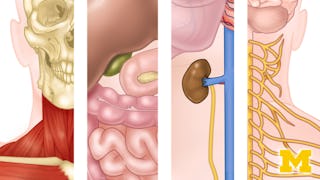 Status: Free TrialFree TrialU
Status: Free TrialFree TrialUUniversity of Michigan
Skills you'll gain: Human Musculoskeletal System, Anatomy, Endocrinology, Pulmonology, Cardiology, Respiration, Gynecology, Hematology, Obstetrics And Gynecology, Orthopedics, Neurology, Urology, Nephrology, Kinesiology, Physiology, Medical Imaging, Sports Medicine, Biology, Medical Terminology, Cell Biology
4.8·Rating, 4.8 out of 5 stars4K reviewsBeginner · Specialization · 3 - 6 Months
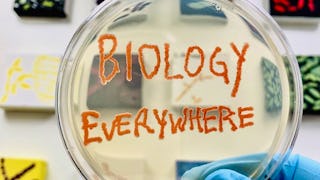 Status: Free TrialFree TrialU
Status: Free TrialFree TrialUUniversity of Colorado Boulder
Skills you'll gain: Molecular Biology, Biochemistry, Human Development, Biology, Life Sciences, Environment, Chemistry, Cell Biology, Environmental Issue, Child Development, Environmental Science, Environmental Resource Management, Music, Biotechnology, General Science and Research, Decision Making, Natural Resource Management, Liberal Arts, Oncology, Sustainable Development
4.5·Rating, 4.5 out of 5 stars385 reviewsBeginner · Specialization · 3 - 6 Months
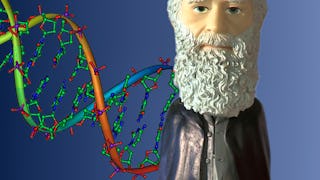 Status: PreviewPreviewD
Status: PreviewPreviewDDuke University
Skills you'll gain: Molecular Biology, Biology, Biostatistics, Biotechnology, Environmental Science, Scientific Methods, Mathematical Modeling
4.8·Rating, 4.8 out of 5 stars1.9K reviewsMixed · Course · 1 - 3 Months
What brings you to Coursera today?
 Status: PreviewPreviewD
Status: PreviewPreviewDDuke University
Skills you'll gain: Physiology, Respiration, Endocrinology, Anatomy, Pulmonology, Cardiology, Nephrology, Urology, Kinesiology, Vital Signs, Neurology, Biology, Nutrition and Diet
4.8·Rating, 4.8 out of 5 stars5.3K reviewsBeginner · Course · 1 - 3 Months
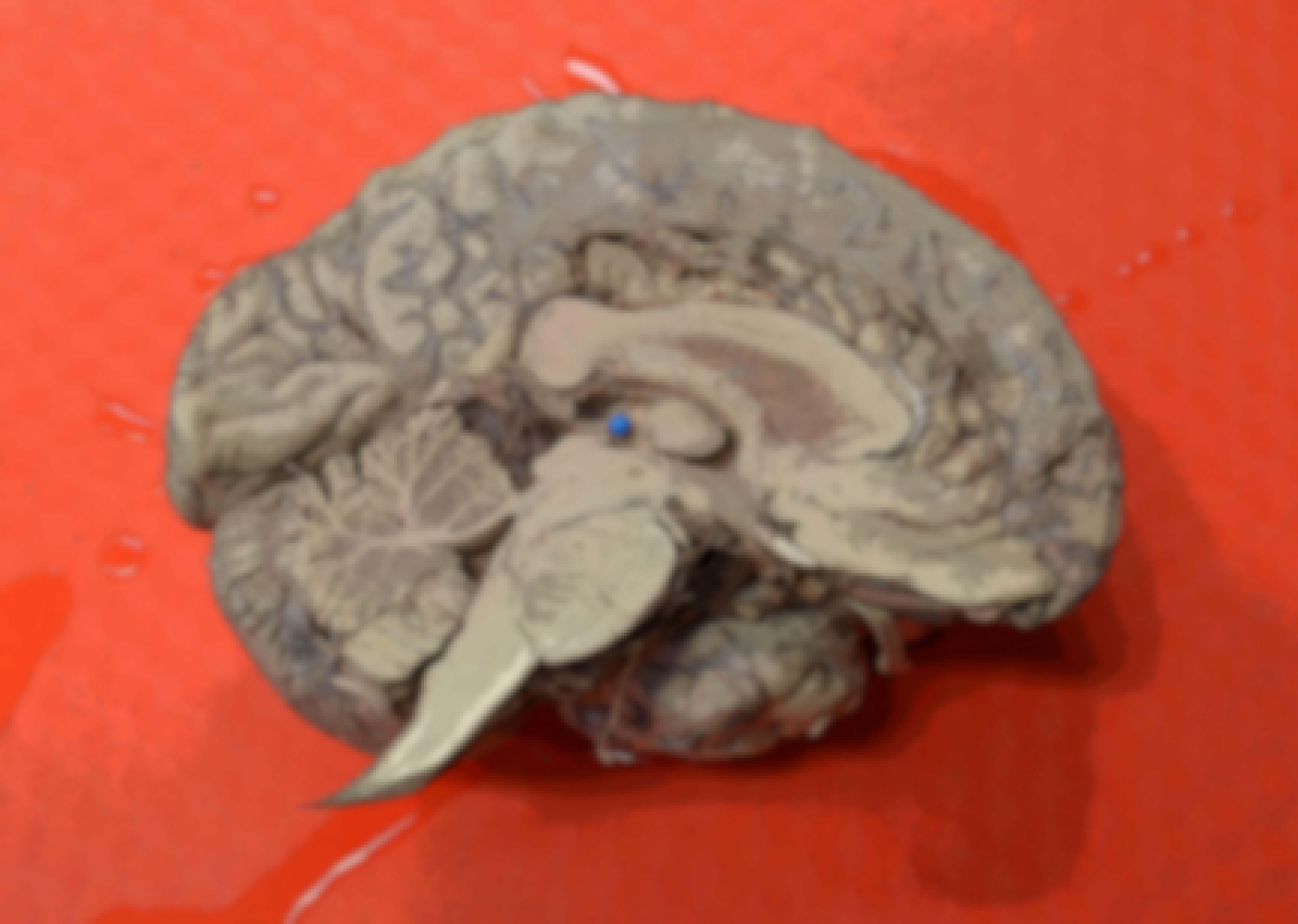 Status: PreviewPreviewT
Status: PreviewPreviewTThe University of Chicago
Skills you'll gain: Neurology, Physiology, Anatomy, Behavioral Health, Mental and Behavioral Health, Mental Health Diseases and Disorders, Vital Signs, Control Systems, Coordination, Biology, Communication Systems
4.9·Rating, 4.9 out of 5 stars3.2K reviewsBeginner · Course · 1 - 3 Months
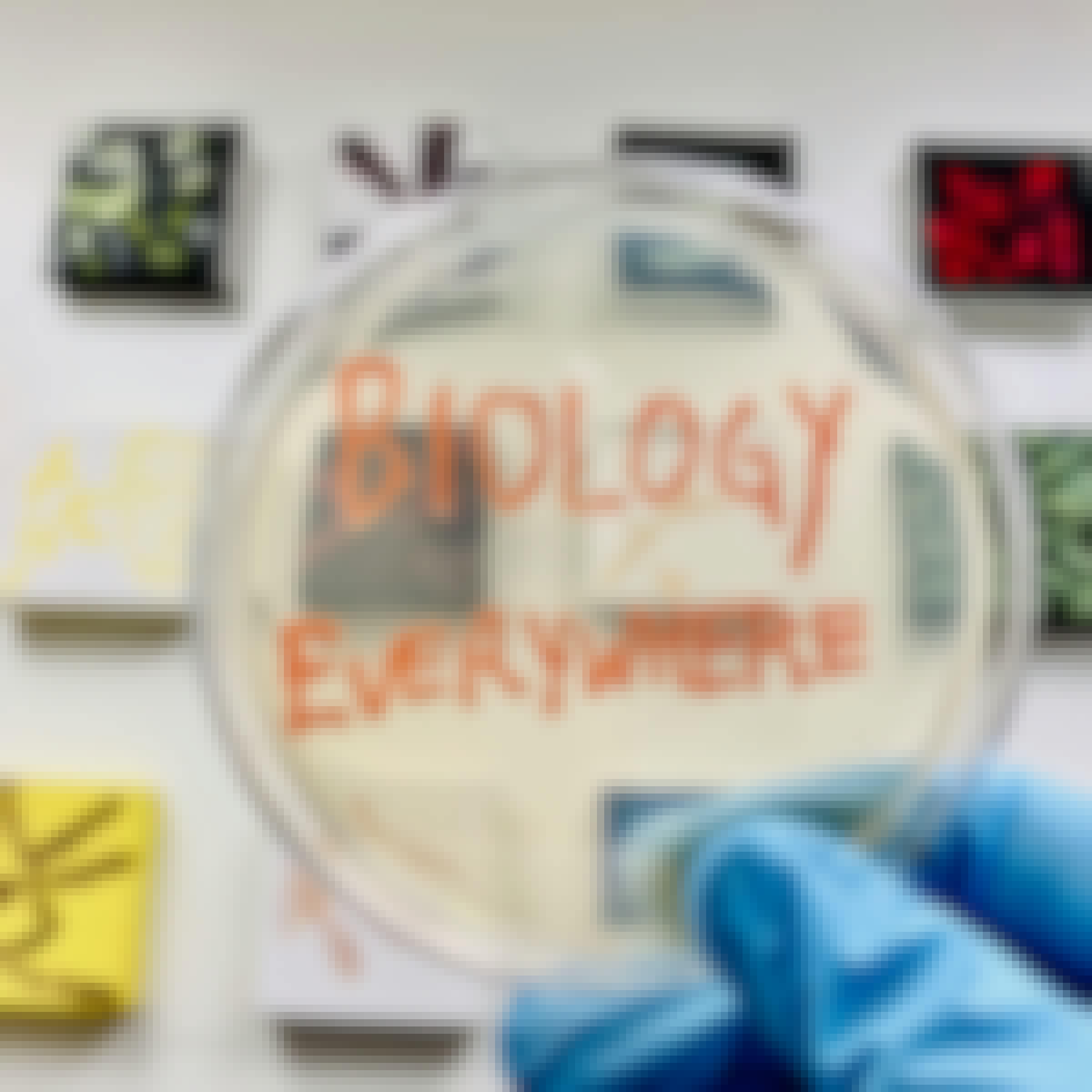 Status: Free TrialFree TrialU
Status: Free TrialFree TrialUUniversity of Colorado Boulder
Skills you'll gain: Biochemistry, Chemistry, Biology, General Science and Research, Molecular Biology, Scientific Methods, Water Quality, Nutrition and Diet
4.5·Rating, 4.5 out of 5 stars238 reviewsBeginner · Course · 1 - 4 Weeks
 Status: PreviewPreviewA
Status: PreviewPreviewAAmerican Museum of Natural History
Skills you'll gain: Life Sciences, Biology, Environmental Science, Environment, Biochemistry, Physiology, Hydrology, Environmental Issue, Anatomy, Water Quality, Behavioral Health, Research
4.8·Rating, 4.8 out of 5 stars593 reviewsBeginner · Course · 1 - 3 Months
 Status: Free TrialFree TrialR
Status: Free TrialFree TrialRRice University
Skills you'll gain: Human Musculoskeletal System, Anatomy, Endocrinology, Orthopedics, Kinesiology, Physiology, Neurology, Medical Terminology, Cell Biology, Biology, Chemistry, Clinical Practices, Sports Medicine, Physical Therapy, Molecular, Cellular, and Microbiology, Life Sciences, Lifelong Learning
4.7·Rating, 4.7 out of 5 stars164 reviewsIntermediate · Specialization · 3 - 6 Months
 Status: PreviewPreviewS
Status: PreviewPreviewSStanford University
Skills you'll gain: Molecular Biology, Biotechnology, Biochemistry, Chemical and Biomedical Engineering, Biology, Scientific Visualization, Structural Analysis
4.7·Rating, 4.7 out of 5 stars152 reviewsBeginner · Course · 1 - 4 Weeks
In summary, here are 10 of our most popular biology courses
- Introduction to Biology: Ecology, Evolution, & Biodiversity: Rice University
- Cancer Biology: Johns Hopkins University
- Molecular and Cell Biology: Lecturio
- Anatomy: University of Michigan
- Biology Everywhere: University of Colorado Boulder
- Introduction to Genetics and Evolution: Duke University
- Introductory Human Physiology: Duke University
- Understanding the Brain: The Neurobiology of Everyday Life: The University of Chicago
- Biology Everywhere Foundations: University of Colorado Boulder
- Marine Biology: American Museum of Natural History
Frequently Asked Questions about Biology
Biology is the scientific study of life and living organisms, encompassing various fields such as ecology, genetics, and microbiology. Understanding biology is crucial because it helps us comprehend the complexities of life, the interdependence of ecosystems, and the biological processes that sustain health and well-being. This knowledge is foundational for addressing global challenges like climate change, disease prevention, and biodiversity conservation.
A degree in biology can open doors to a variety of career paths. Common job roles include research scientist, laboratory technician, environmental consultant, and healthcare professional. Additionally, biology graduates can find opportunities in education, biotechnology, pharmaceuticals, and conservation. The versatility of a biology background allows for careers in both public and private sectors, making it a valuable field of study.
To succeed in biology, you should develop a strong foundation in scientific principles and methodologies. Key skills include analytical thinking, problem-solving, and proficiency in laboratory techniques. Familiarity with data analysis and bioinformatics is increasingly important, as is the ability to communicate complex concepts clearly. Additionally, teamwork and collaboration skills are essential, especially in research settings.
There are many excellent online biology courses available to suit various interests and skill levels. For a comprehensive introduction, consider the Introduction to Biology: Ecology, Evolution, & Biodiversity Specialization. If you're interested in a specific area, such as cancer research, the Cancer Biology Specialization offers in-depth knowledge. For those looking to integrate biology with technology, the Biology Meets Programming: Bioinformatics for Beginners course is a great choice.
Yes. You can start learning biology on Coursera for free in two ways:
- Preview the first module of many biology courses at no cost. This includes video lessons, readings, graded assignments, and Coursera Coach (where available).
- Start a 7-day free trial for Specializations or Coursera Plus. This gives you full access to all course content across eligible programs within the timeframe of your trial.
If you want to keep learning, earn a certificate in biology, or unlock full course access after the preview or trial, you can upgrade or apply for financial aid."
Learning biology can be approached through various methods. Start by enrolling in online courses or attending lectures to gain foundational knowledge. Supplement your studies with textbooks, scientific journals, and educational videos. Engaging in hands-on laboratory work or field studies can enhance your understanding. Additionally, joining study groups or online forums can provide support and foster discussion.
Typical topics covered in biology courses include cell biology, genetics, evolution, ecology, and physiology. Many courses also explore specialized areas such as microbiology, biotechnology, and environmental science. Practical skills, such as laboratory techniques and data analysis, are often integrated into the curriculum to provide a well-rounded education.
For training and upskilling employees in biology, courses like the Biology Everywhere Specialization can be particularly beneficial. This specialization covers a broad range of biological concepts and their applications in real-world scenarios. Additionally, the Systems Biology and Biotechnology Specialization offers insights into modern biological techniques and their relevance in various industries.










